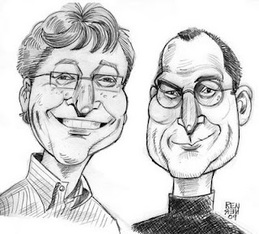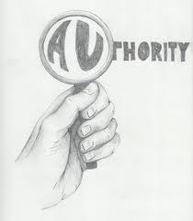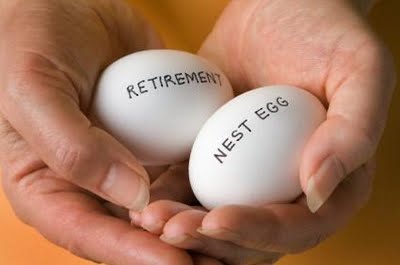 by Bradford Renner by Bradford Renner I’ve wanted a Mac Computer for the longest time. I perused Apple’s offering for the first time back in 2005 but one thing stopped me: the interface was very unfamiliar territory for me. At the time, the main tools I used were Word Processing (MS Word) and Number Processing (MS Excel). As a young intern at an investment bank my basic skills had been bumped up to a professional level. I was very comfortable in the world of Microsoft. I knew almost every option that was available to me not only using the slow-coach mouse method but also using the more rapid keyboard short cuts. The drop-down menus offered by Microsoft made exploring very easy. Ultimately, I decided that as pretty as I thought that Macs were, they were a step too far for me. In 2007, Microsoft released its new versions of Word and Excel. Gone were the drop-down menus with short cut prompts to lead you along. To use shortcuts, you had to have them already committed to memory from previous experience with the programs, the prompts were gone. I didn’t like the new interface and found it a little harder to use. Come 2010, the upgraded version is even worse than its 2007 cousin. The key issue: usability! Microsoft has changed its platform so drastically that it now makes sense to learn an entirely new operating system. The unfamiliarity that I felt with Macs is now also applicable to the key tools that I like to use on Microsoft computers. Importantly, Mac has now become firmly embedded in people’s minds as the computer of choice for creative types: video and picture editors, music creators and so forth. If you want to be considered serious about your technology you need to have a Mac. For the nth time today, I explored the idea of buying a Mac. I went to London’s flagship Apple store in Covent Garden and I am officially sold. I like to think of myself as a professional user of technology. Mac offer training very cheaply, Microsoft do not. This makes the prospect of plowing into Planet Mac so much less daunting and is definitely a plus. I did enjoy using PCs but like millions of serious techies, I am crossing the bridge to Mac. Microsoft laid the foundation for this decision, they changed their technology without breaking dedicated users in with courses, webinars or any other training. In Economics, demand is defined as want that must be backed up by the ability (money) and willingness to purchase a good. Want and willingness I have, now I just need to take care of ability: donations are welcome!
7 Comments
This blog was written a week ago and wasn’t meant to be posted until the weekend but something happened today that required that I post it right away. I explain the event at the end. When I first came to England I had never spent any time thinking about the concept of atheism. In fact, having never met an atheist I thought the term was a dictionary concept rather than anything that actually happened in practice. The first time someone told me that they didn’t believe in God I recall being appalled. I went from having a mild crush on the guy to thinking: I don’t really like you, for if you don’t believe in God you have got to be satanic. That moment was a turning point in my friendship with this guy because I don’t think I put very much into being friends with him after that. When he told me that he suffers from depression, I remember thinking that it was probably linked to his non-belief of a higher power! Being at the University of Cambridge, that was just the first of many encounters. Cambridge is a breeding ground for thinkers, people that question everything and from that moment on I met many atheists with the end result that I now understand and respect their view. I think it takes a lot more effort to not believe than it does to believe. Most of us were born within a certain religion. We were indoctrinated with it from a young age and have never thought to question it. A lot of introspection resulted from my meeting and questioning so many atheists. Every single atheist I know has a very sound moral code. In fact many behave better than some of my fellow Christians, I know that if I misbehave I can just go to confession and God will forgive. An atheist has to live with it in their conscience, they can’t pass the buck on to God. Upon looking at myself I accepted that: I have never known hunger. I have never known cold. I grew up in a two-parent home where I was loved and cared for. I have never known any real want. Mine has been a safe and sheltered existence and that in itself means I cannot judge those that have suffered in ways I can only imagine: Many people out there are going to bed without any food tonight. If such a person told me they didn’t believe in a God, how could I even begin to judge them negatively? There are many little boys and girls out there tonight being abused by the people that are supposed to protect them. A girl out there is zealous and enthusiastic about a trip she has been promised to a developed country where she can better herself – little does she know that she has just become someone’s drug mule or sex slave. I watched a program a couple of weeks ago where a woman was being forced by her husband to sleep with other men for money; he beat her if she refused. Some punters came to her house at lunch time, her husband made her cook lunch for all of them, he then accepted some money and she had to a go to a room to let the man do his business. She described herself as being “the unluckiest woman in the world”. “What could be worse than this?” she asked the journalist. Indeed, what could? I for one could only weep as I watched the injustice unfold.  So, what ominous event happened today? Sometimes events call one to question whether God does truly exist and today was one such day for me. My sister’s Facebook status update in the morning said something about God always knowing what was going to happen in advance of its occurrence and as such we should trust him. Cynically, I thought, “Does he know in advance when a helpless five year old child is going to be molested by those that should be trusted?” Watch enough episodes of Law and Order: SVU and you too will think in these mysterious ways. Anyway, the very thought made me begin to question God’s existence. When I got home from work I decided to do a patch of housework, I very rarely do housework during the week, I save it for the weekend. I would say this event occurs but once a month, if that (my husband says once a year!) As I was cleaning I decided to clean out a compartment of my tumble dryer that’s supposed to be cleaned once every three to six months – it hadn’t been cleared in at least a year. On the second scoop out of the gunk, I found a ring that belongs to neither me nor my husband; a guest must have forgotten it. It reads: Trust in the LORD with all your heart and lean not on your own understanding Pr 3:5. I was spooked! Can a question be more directly answered?
The Business 2012 conference at the O2 Arena in London was an enjoyable and entertaining event but one speaker stood out amongst the multitude. Business 2012 was designed to be a showcase of support services for business. All the stands were resources that a business needs: printing services, understanding copyright law and the tax system and the most popular one this year: how to use internet marketing (IM). I was primarily interested in internet marketing because there is a fair amount you can do for free. I enjoyed a talk by two guys from Video Results that added a different spin to the usual chatter about internet marketing. I saw two speakers (Simon Coulson and Nigel Botterill) each of whom had become millionaires via an internet business and following their internet success were now making more mula with ‘how to do it’ courses. Success breeds success. Invariably, at the end of each seminar, the speaker would offer a “great” deal on their coaching services with a view to sucking in a few customers. I’m a hard sell: I didn’t buy anything; I got as much free info as I could, took their website addresses and decided I would just learn from watching. Importantly, I don’t have a few grand lying around to spend on courses! Write a book and I’ll buy it. Anyhow, one guy I went to impressed me the most because he completely ignored IM and talked about the effectiveness of old-school marketing. He said he hates employment because he finds having to fill out a form when he wants to go on holiday a most offensive corporate requirement. He prefers to swan off without having to ask. What I learnt from Nick Davies: The beauty of email is also its shortfall. Lots of people bash out emails because they are so easy. So when he started a business a few years ago he made a list of his target corporate clients and started making phone calls with a view to meeting up. Attractive letters If he couldn’t get hold of someone by phone to arrange a meeting, he wrote a letter. Nowadays people receive a lot less physical mail than was the case in the past so it may well be worth buying an attractive package and sending a letter and a sample to prospective buyers or distributors. The MAN However, don’t just make calls and blast letters out willy nilly! Try your best to figure out who the MAN is. That is the person with the Money, Authority and the Need (they don't have to be male!). Every organization has a person who has been entrusted with decision making power. Your sales pitch will be much more effective if you can find them. It’s a bit annoying to buy tea and biscuits for Suzy, and then to have her say “I’ll have to speak to Jane about this, Jane makes all decisions regarding [blah]”! You should have been speaking to Jane in the first place. Of course if Jane trusts Suzy and you really impressed Suzy then it’s not a complete waste – except you’ll probably have to come back and re-pitch to Jane. So, in all endeavours, as you try to build up a business don’t forget about traditional marketing and that your quest for sales is a quest for the MAN!
 Book stack from: funfacts.com.au Book stack from: funfacts.com.au Read this article first. “The death of publishing is greatly exaggerated. We will still need publishers as long as we read books, just as we still need critics to review those books. It is part of the great filtering process of literature and culture.” Sebastian Shakespeare I think this article misses three key points: Self-published does not mean self-edited I wrote my first novel in 2010. I haven’t yet published it but I wrote it for the sake of writing it. I wanted to produce a thought-provoking, well written story and upon completion I submitted the work to a professional editor who read the work, edited it and gave me an 8-paged critique. Everyone knows that poorly written work won’t sell and you will find that many self-published works have been edited professionally. Self publishers aren’t going the DIY route because they can’t find a publisher I can think of at least three reasons that one might choose to side-step the traditional route. Ease – the publishing industry makes getting your work even read very difficult. This, in part, is because they are inundated with manuscripts. To help them sort through the stuff publishers prefer submissions channelled via an “agent” and this long chain is frankly off putting. Self-publishing requires a little technical know-how and you’re up and away. Many gen-Ys are super confident with technology and will choose the quick and easy way if they can’t be convinced that there is a real benefit in choosing the more treacherous path. Control – the publisher, being the ‘fountain of knowledge’ that she is on themes that are commercially viable and those that are not can exert so much control over a piece of work that you ultimately don’t even recognise it as yours. Or have to make too many compromises. Some people prefer having more control rather than less and self-publishing provides that. Income – a traditional publisher will typically give you 5-10% of profits. Self-publishing can yield up to a 70% share. Publishers might argue that you are getting a smaller piece of a larger pie but why should you be happy with that. If you have done a piece of work you should get most of the reward. Reviewers not publishers or professional literary critics “sort the wheat from the chaff” We live in a world of reviews. I understand that most readers are women especially when it comes to fiction. They base a good portion of what they read on recommendations from friends. Failing that, reviews from every day people help us decide what to read next. If a literary critic rates a book highly but on Amazon the majority of readers rate it 1 out 5, that book won’t do well. The review system adds democracy to the process and is now key in sorting through the immense variety we face in this age of mass consumption. You will frequently see comments like “I wish I had read the reviews before buying this book, it was a total and utter waste of time…” That is the power of reviews. I read reviews before every single purchase now, I seldom bother going to the shops especially when the weather is poor. Every electronic gadget I have (except my digicam) was purchased online. And in the case of the digicam I used online prices to squeeze the price down. No one reads a book because it was published by such and such a publisher People have favourite authors. Once an author is established they will have a dedicated following that will read their output regardless of how it is published. This is why you are finding traditionally published authors going the DIY route. Is publishing dead? No, I don’t think so but they are going to have to change their formulae especially when it comes to the income share. Their magical powers of distribution have been taken by technology so they will have to find relevance in another format. I tweet @GirlBanker
If you’re solely depending on someone else, be it the Government or the company you work for to provide for your retirement, start thinking now about what percentage of the time you plan on choosing food over heating. If there’s one thing that can be learnt from the credit crunch, it’s that governments and companies are more likely to fail than one would like to believe. Let’s start from the beginning. Last week I was watching “Loose Women” on TV. The few times I’d flipped past the show whilst I perused what was on, I had perceived it to be an intellectually upmarket show where women discuss pertinent issues of the day. In fact, I watched it for ten minutes and had to change the channel because I couldn’t take the sheer ridiculousness of some of the things that were being said. One lady boasted proudly that she has never bought an investment property and owned only the property she lived in. She thought buying property was greedy evidenced by the property bubble and the credit crunch. It may have been the same lady, perhaps not, who stated that she’d grown up on a council estate but because her mother was quite an "aspirational" woman she opted to buy when Thatcher brought in the right-to-buy council housing. She went on to argue that her mother had disadvantaged herself in doing so because as a property owner she now can’t get as much out of the government. I think this was the point when I switched screens. Fact: most western governments are spending more than they collect in tax each year. It naturally follows that their deficit is widening with every passing year. The government cannot afford to pay the pensions that it thought it would be able to. Something’s got to give. To make up the difference two things will almost certainly happen:
I think if well planned, property is one of the best investments for retirement. However, you have to 1) start young and 2) have a portfolio. Paying off the property you live in is part of the plan but because you live in it, it can be hard to earn an income out of it at the same time. If you’re happy to rent rooms out in your own home then obviously that’s great. Most people prefer not to. WHY DO I THINK PROPERTY IS SO GREAT?  livingstingy.blogspot.com livingstingy.blogspot.com Leverage I paid a 5% deposit on the first property I ever bought. This means I borrowed 19 times what I put in. There is no other situation in which a Jane Average such as myself could get that kind of money. That was 6-years ago when I was 22. A good chunk has been paid down already just by making small monthly payments each month.  Youth The average mortgage is 25 years long. If you plan to completely retire at 60 or 65 it means that any property purchased before the age of 35/40 could feasibly be fully or at least mostly repaid.  Unearned savings Property income is taxable but the interest payments and any reasonable costs e.g. estate agent fees and insurance can be deducted before tax. If you’re being taxed at 40% you’ll still be receiving 60% of the profit. For example, if after interest and other costs you have a £500 profit, the government gets £200, you get £300 which you can use to retire the mortgage or use in any other way you see fit. Regular repayments of the mortgage using this unearned income mean that over a 25 to 30–year period you could have a solid asset base built almost entirely of other people's money.  Annuity If you manage to build up a property portfolio of say four houses by the age of 40, excluding the one you live in, it’s possible for those mortgages to be fully repaid or mostly repaid by age 60-65. If those four properties can be rented out at £500 each, that is an income of £2,000 per month. This is enough for an old couple to live on comfortably. Even with out a capital gain, a pension is insured. By this point, your home will be fully paid down too so the main expenses are food and utilities (gas, electricity, water, insurances, phone and internet) with plenty left over for a holiday or two. In addition, the property portfolio will be (almost) 100% equity so you could decide to sell up and put that money to better use. You’re financially flexible. The interest-only view I know some people who subscribe to the view that you should never repay a home, just get an interest only mortgage and own the house for capital gains. I have two views on this:
 Job done. Now, is that greedy, I ask? I think with foresight and delayed gratification, anyone can achieve this. I don't think you need to be particularly brilliant at anything nor do you need to be earning big bucks. You just need to take advantage of a bargain when you see one and interest rates when they are low. Some of my friends laugh at my shopping at Primark but I tell them, less now for more later…this is my mantra, join me so in retirement we can all be sun bathing in the Bahamas sipping on piña coladas with not a financial problem casting a shadow over our retirement. If you haven't read Rich Dad, Poor Dad already. Please do get it, it help me to form some of my views on money. Don't just read it, absorb it and digest it. Links to Amazon.com and .co.uk below.
|
Archives
December 2015
Categories
All
By Heather Katsonga-WoodwardI'm always thinking, debating, considering and revising my views - some of those deliberations will be shared right here. |













 RSS Feed
RSS Feed
